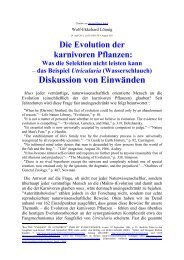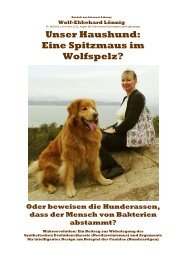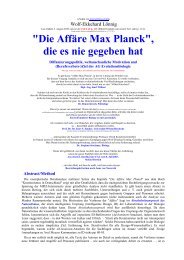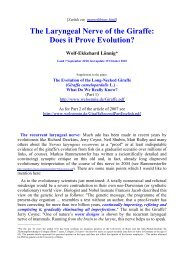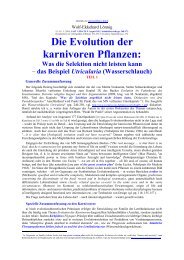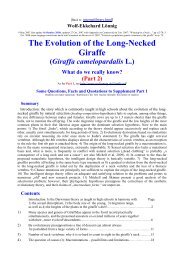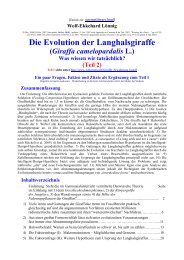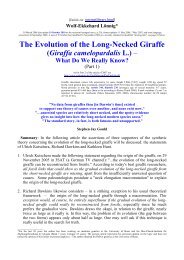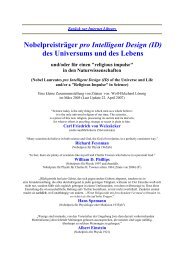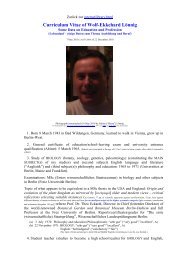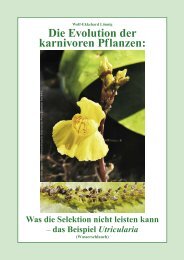Die Affäre Max Planck - Wolf-Ekkehard Lönnig
Die Affäre Max Planck - Wolf-Ekkehard Lönnig
Die Affäre Max Planck - Wolf-Ekkehard Lönnig
Sie wollen auch ein ePaper? Erhöhen Sie die Reichweite Ihrer Titel.
YUMPU macht aus Druck-PDFs automatisch weboptimierte ePaper, die Google liebt.
81<br />
wird: Axel Meyers (A. M.) Bemerkungen zur Huxley-Wilberforce-Debatte (p.<br />
330). (Meyers Beitrag erschien zuerst in: <strong>Max</strong> <strong>Planck</strong> Forschung. Das Wissenschaftsmagazin der <strong>Max</strong>-<strong>Planck</strong>-<br />
Gesellschaft, 1/2006: 16-18 und später auch in englisch (<strong>Max</strong> <strong>Planck</strong> Research 2/2006, pp. 16-18) unter dem Titel<br />
Intelligent Design – not the fittest sowie in einer leicht überarbeiteten Fassung in Kutscheras (Hg.) "Kreationismus<br />
in Deutschland" 2007 als Intelligent Design ist eine pseudowissenschaftliche Mogelpackung, alles auch im Internet<br />
abfragbar).<br />
Gehen wir zum Thema gemäß Buchtext:<br />
(35) A. M. (Buchversion hrsg. von Kutschera): Wilberforce provozierte Huxley zur Debatte mit der<br />
berühmten Frage ob er vorzöge zu glauben, dass er (Huxley) vom Affen von der Großmutter mütterlicherseits oder<br />
väterlicherseits abstammte. Huxley erwiderte, dass er lieber einen Affen, als einen Bischof zum Vorfahren hätte<br />
und, weiter an Wilberforce gerichtet, er sich schämen würde mit einem Mann in Verbindung gebracht zu werden,<br />
der seine intellektuellen Qualitäten dazu missbrauchen würde, die Wahrheit zu verdrehen.<br />
W.-E. L.: So wurde die Geschichte fast 40 Jahre danach, in der "October 1898<br />
issue of Macmillan's Magazine, in an article entitled "A Grandmother's tales""<br />
(Lucas) berichtet. Der Historiker J. R. Lucas bemerkt in seinem Nature-Beitrag<br />
"Wilberforce no ape" zu den wissenschaftlichen Einwänden von Wilberforce<br />
(1980, p. 480):<br />
"These were serious scientific arguments, worthy of a vice-president of the British Association. Darwin<br />
acknowledged their cogency. … [Darauf folgt ein Glaubensbekenntnis zu Darwins Thesen heute, aber:]… It is<br />
doubtful that Wilberforce asked Huxley whether he was descended from an ape. It makes a good story, but<br />
Wilberforce had used the first person plural in his review, and the use of the first person is borne out by<br />
Wilberforce’s biography and one – admittedly late – account. What Wilberforce may have asked Huxley in the<br />
second person is where he drew the line between human descendants and ape-like ancestors, if, as was generally<br />
admitted, the offspring was of the same species as the parents. … Huxley, however, was ready to answer the<br />
question he had not been asked. Three months earlier, in the April issue of the Westminster Review, he had accused<br />
critics of Darwin of making him out to be no better than an ape himself, and since Wilberforce was now criticising<br />
him for being a Darwinian, he must be calling him an ape too.”<br />
Rodney Stark kommentiert nach einem Überblick, welche Autoren die auch von<br />
A. Meyer wiedergegebene Version der Geschichte bisher wiederholt haben (2003,<br />
p. 188):<br />
"Trouble is it didn’t happen. … No other account of these meetings, and there were many written at the time,<br />
mentioned remarks concerning Huxley's monkey ancestors or claimed that he made a fool of the bishop. To the<br />
contrary, many thought the bishop had the better of it, and even many of the committed Darwinians thought it at<br />
most a draw. Moreover, as all of the scholars present at Oxford knew, prior to the meeting Bishop Wilberforce<br />
had published a review of The Origin in which he fully acknowledged the principle of natural selection as the<br />
source of variations within species. However, he rejected Darwin's claims concerning the origin of species, and<br />
some of these criticisms were sufficiently compelling that Darwin immediately wrote his friend the botanist J. D.<br />
Hooker (1817-1911) that the review "is uncommonly clever; it picks out with skill all the most conjectural parts,<br />
and brings forward well all the difficulties. It quizzes me quite splendidly.""<br />
Wer verdreht die Wahrheit?<br />
(36) A. M. (Buchversion hrsg. von Kutschera): Es wurde später berichtet, dass eine Dame im Publikum zu<br />
diesem Zeitpunkt der Debatte in Ohnmacht fiel und aus dem Saal in Oxford getragen werden musste. (Version in<br />
<strong>Max</strong> <strong>Planck</strong> Forschung. Das Wissenschaftsmagazin der <strong>Max</strong>-<strong>Planck</strong>-Gesellschaft 1/2006: 16-18: "Berichten<br />
zufolge fiel zu dem Zeitpunkt der Debatte eine Dame in Ohnmacht und musste aus dem Saal getragen werden.")<br />
W.-E. L.: Massimo Pigliucci, ein Kritiker der ID-Theorie und Verteidiger des<br />
Naturalismus sowie der Synthetischen Evolutionstheorie, kommentiert diesen<br />
Punkt wie folgt: "Well, besides Caudill’s reasonable remark that the woman more<br />
likely fainted because of the hot air inside the crowded room, what actually<br />
happened only partly follows the story line favored by evolutionists. First, the<br />
debate involved a dozen people, not just Huxley and Wilberforce. Second, there



